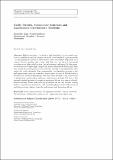Costly circuits, submodular schedules and approximate Carathéodory Theorems
Author(s)
Bojja Venkatakrishnan, Shaileshh; Viswanath, Pramod; Alizadeh Attar, Mohammadreza
Download11134_2017_9546_ReferencePDF.pdf (560.8Kb)
OPEN_ACCESS_POLICY
Open Access Policy
Creative Commons Attribution-Noncommercial-Share Alike
Terms of use
Metadata
Show full item recordAbstract
Hybrid switching—in which a high bandwidth circuit switch (optical or wireless) is used in conjunction with a low bandwidth packet switch—is a promising alternative to interconnect servers in today’s large-scale data centers. Circuit switches offer a very high link rate, but incur a non-trivial reconfiguration delay which makes their scheduling challenging. In this paper, we demonstrate a lightweight, simple and nearly optimal scheduling algorithm that trades off reconfiguration costs with the benefits of reconfiguration that match the traffic demands. Seen alternatively, the algorithm provides a fast and approximate solution toward a constructive version of Carathéodory’s Theorem for the Birkhoff polytope. The algorithm also has strong connections to submodular optimization, achieves a performance at least half that of the optimal schedule and strictly outperforms the state of the art in a variety of traffic demand settings. These ideas naturally generalize: we see that indirect routing leads to exponential connectivity; this is another phenomenon of the power of multi-hop routing, distinct from the well-known load balancing effects. Keywords: Data center networks, Bridges and switches, Circuit networks, Network flows, Submodular optimization, Approximation algorithms
Date issued
2017-09Department
Massachusetts Institute of Technology. Department of Electrical Engineering and Computer ScienceJournal
Queueing Systems
Publisher
Springer US
Citation
Bojja Venkatakrishnan, Shaileshh, et al. “Costly Circuits, Submodular Schedules and Approximate Carathéodory Theorems.” Queueing Systems, vol. 88, no. 3–4, Apr. 2018, pp. 311–47.
Version: Author's final manuscript
ISSN
0257-0130
1572-9443